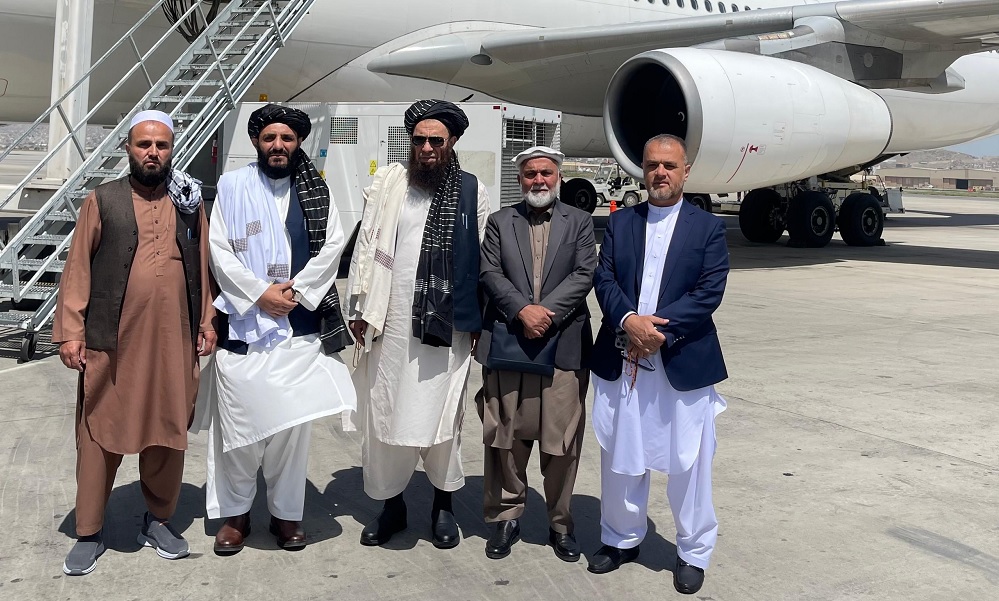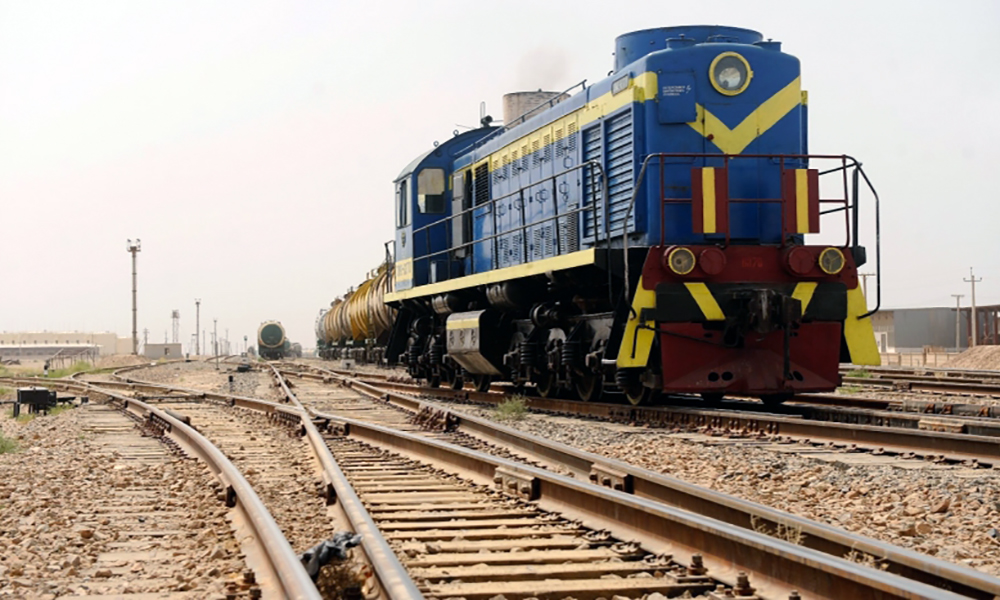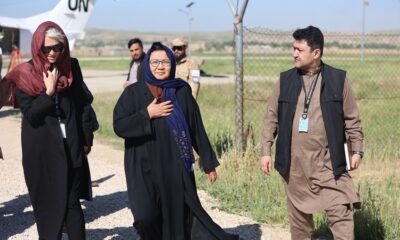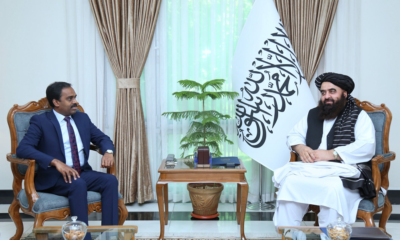Business
Azizi: Afghanistan needs ‘industrial revolution’ to be self-sufficient

The Islamic Emirate of Afghanistan’s acting minister of commerce and industry, Nooruddin Azizi, says that Afghanistan will not achieve self-sufficiency until an “industrial revolution” occurs in the country.
Speaking on Tuesday, Azizi said at the opening ceremony of a new iron smelting factory in Kabul that the Ministry of Industry and Trade is focusing more on strengthening domestic industries in order to lead the country towards economic self-sufficiency.
This factory was built at a cost of $10 million and 700 jobs have been created.
“The Islamic Emirate of Afghanistan is committed to supporting the economic strongholds and domestic production of the country, and be sure that we are committed to the development of our production,” said Azizi.
He added that the Islamic Emirate focuses more on domestic industries and provides serious support to investors inside the country.
“I will say clearly that we are committed to providing all-round support to the private sector and we will expand this process,” Azizi added.
Officials from the Ministry of Economy also said the country is moving towards positive economic developments and that the Ministry supports private sector investments.
“We consider the private sector as a strong partner in the country’s economy and we are ready to increase the role of the private sector in the self-sufficiency of the country’s economy,” said Abdul Latif Nazari, the deputy economy minister.
At the same time, the Chamber of Industries and Mines also says that when domestic products and artisans are supported, investment in the country will increase.
“The country’s domestic production has been supported by the Islamic Emirate, but if the support is extended, the private sector will invest more in the country’s production [facilities],” said Sakhi Ahmad Paiman, Deputy Head of the Chamber of Industries and Mines.
“The government, the nation, and the private sector should use domestic products, and the private sector should also produce high quality [goods] in order to solve the existing problems,” said Khan Jan Alkozi, a member of the Chamber of Commerce and Investment.
There are currently about 40 factories operating in the iron smelting sector in the country.
Business
Afghan businessman to invest up to $12 million in iron ore extraction in Panjshir

An unnamed Afghan businessman is reportedly ready to invest up to $12 million in iron ore mining in Panjshir province, the provincial governor’s spokesman Saifuddin Laton said Sunday.
According to Laton, the businessman has shown interest in investing between $3 and $12 million to mine an area covering 22 square kilometers in Paryan district in Panjshir.
Laton said the contract for this project has been approved by the Economic Directorate of the Prime Minister’s Office of the Islamic Emirate of Afghanistan (IEA).
In addition to extraction, the businessman will also carry out the processing and packaging of the iron ore within the province to create greater added value.
Laton said that in the first phase, the company will launch an exploratory program of the reserves over six months, during which around 500 jobs will be created.
After completing this phase, formal extraction work will begin, he said.
Afghanistan possesses substantial iron ore reserves, estimated at 2.2 billion tonnes, making it a top 10 country for extractable iron.
The largest deposit, Hajigak, is located in Bamiyan province, and contains an estimated 1.7 billion tonnes of high-grade ore.
Business
Afghan deputy agriculture minister leaves for Iran’s international expo

Sadri Azam Osmani, Deputy Minister of Agriculture, Irrigation and Livestock, on Saturday left Kabul to participate in the 7th International Exhibition of Iran’s Export Capabilities in Tehran.
The expo will be held from April 28 to May 2. According to the organizers, between 2,000 and 3,000 foreign traders from around the world are expected to attend.
Osmani expressed hope that this trip will pave the way for the growth of trade and attract more investments to Afghanistan.
Business
Pakistan’s deputy PM discusses Trans-Afghan Railway Line project with Uzbek FM
On Thursday, in a post on X, Pakistan’s Foreign Ministry said Dar hoped that the three countries would soon sign the framework agreement for this important regional connectivity project.

Pakistan’s Deputy Prime Minister and Foreign Minister Ishaq Dar held a telephone conversation with the Foreign Minister of Uzbekistan, Saidov Bakhtiyor Odilovich, on Thursday to discuss the Trans-Afghan Railway Line Project.
This comes after Dar’s recent visit to Kabul, where he held talks with officials on the planned Uzbekistan-Afghanistan-Pakistan Railway Line Project.
The three neighboring countries signed an agreement in February 2021 to construct a 573-kilometer railway line through Afghanistan, connecting landlocked Central Asia to Pakistan seaports, with an estimated cost of $4.8 billion to enhance regional economic connectivity.
On Thursday, in a post on X, Pakistan’s Foreign Ministry said Dar hoped that the three countries would soon sign the framework agreement for this important regional connectivity project.
The two leaders also discussed strengthening bilateral relations, enhancing economic and trade connectivity, promoting people-to-people ties, and exchanged views on current regional and international issues.
-

 Sport4 days ago
Sport4 days agoSri Lanka A defeats Afghanistan A by 4 wickets in Abu Dhabi
-

 Business5 days ago
Business5 days agoAfghanistan’s growth prospects remain uncertain amid global uncertainty: World Bank report
-

 World5 days ago
World5 days agoUkraine ready to hold talks with Russia once ceasefire in place, Zelenskiy says
-

 Latest News4 days ago
Latest News4 days agoAWCC activates new site in Nangarhar’s Kuz Kunar district
-

 Latest News4 days ago
Latest News4 days agoTarig Ali Bakheet and Japan’s Deputy Foreign Minister discuss Afghanistan’s situation
-

 Climate Change4 days ago
Climate Change4 days agoPowerful earthquake of 6.2 magnitude shakes Istanbul
-

 Business3 days ago
Business3 days agoPakistan’s deputy PM discusses Trans-Afghan Railway Line project with Uzbek FM
-

 Latest News4 days ago
Latest News4 days agoSpecial meeting will be held to launch Afghanistan–Russia joint commission, says Kabulov
























